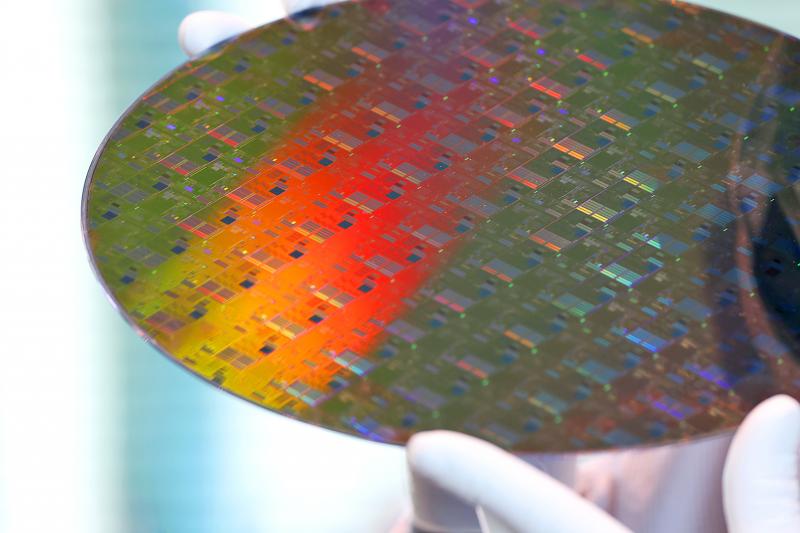Shares of silicon wafer supplier Formosa Sumco Technology Corp (台勝科) outperformed the broader market last week, reflecting investors’ expectation that its gross margin is likely to expand in the coming quarters as prices continue to climb, analysts said.
Formosa Sumco, which was founded by Japan-based Komatsu Ltd and Taiwan’s Formosa Plastics Group (FPG, 台塑集團) in 1995, focuses on producing 8-inch and 12-inch wafers. The company has a monthly capacity of about 330,000 8-inch wafers and 300,000 12-inch wafers at the FPG complex in Yunlin County’s Mailiao Township (麥寮).
Shares of Formosa Sumco on Friday closed 5.39 percent higher at NT$244.5 in Taipei trading.

Photo: Bloomberg
Last week, they rose 3.16 percent, compared with the broader market’s 0.68 percent rise, Taiwan Stock Exchange data showed.
After limited gross margin expansion in the second quarter of last year, the company on May 10 reported gross margin of 36.3 percent in the first quarter of this year, up 14.07 percentage points from the previous quarter and 15.89 percentage points higher than a year earlier, due to price increases and favorable foreign-exchange rates.
First-quarter revenue grew 17.58 percent quarterly and 26.6 percent annually to NT$3.74 billion (US$126.8 million), driven by a 15 percent increase in average selling prices amid agreement renewals, with long-term agreements accounting for more than 50 percent of total agreements.
Net profit increased 160 percent from the previous quarter and 207 percent from a year earlier to NT$1 billion, with earnings per share of NT$2.58, the highest in the past 12 quarters, Formosa Sumco data showed.
The company is scheduled to hold an earnings conference on Thursday to elaborate on its first-quarter financial results and provide guidance for the upcoming quarters.
“We expect sales and gross margin to rise quarterly going forward, driven by rising spot prices, price negotiations for half-year agreements in the third quarter, and an additional 12-inch capacity of 5 to 10 percent as new capacity ramps up in the second half of the year,” Yuanta Securities Investment Consulting Co (元大投顧) said in a note on Thursday.
In addition to the 12-inch brownfield capacity expansion plan in the second half of the year, Yuanta said that Formosa Sumco is planning a greenfield expansion plan with a US$1 billion investment, as the company aims to add new 12-inch capacity of 100,000 pieces at the Mailiao complex by 2024.
The new capacity is to adopt Sumco Corp’s technology and focus on production of epitaxial silicon wafers, it added.
With capacity expanding more slowly at major suppliers than at foundry companies, Yuanta said that silicon wafer shortages would be the worst next year, while supply and demand would become more balanced in 2025 at the earliest.
The rising content value of end products and larger memory consumption driven by data centers would also boost demand for silicon wafers, Yuanta said.
As a result, the sector’s upcycle would likely continue from this year to 2024, allowing major wafer suppliers such as Formosa Sumco, GlobalWafers Inc (環球晶圓) and Wafer Works Corp (合晶科技) to continue raising prices and see their gross margin expand further, Yuanta said.

Sweeping policy changes under US Secretary of Health and Human Services Robert F. Kennedy Jr are having a chilling effect on vaccine makers as anti-vaccine rhetoric has turned into concrete changes in inoculation schedules and recommendations, investors and executives said. The administration of US President Donald Trump has in the past year upended vaccine recommendations, with the country last month ending its longstanding guidance that all children receive inoculations against flu, hepatitis A and other diseases. The unprecedented changes have led to diminished vaccine usage, hurt the investment case for some biotechs, and created a drag that would likely dent revenues and

Global semiconductor stocks advanced yesterday, as comments by Nvidia Corp chief executive officer Jensen Huang (黃仁勳) at Davos, Switzerland, helped reinforce investor enthusiasm for artificial intelligence (AI). Samsung Electronics Co gained as much as 5 percent to an all-time high, helping drive South Korea’s benchmark KOSPI above 5,000 for the first time. That came after the Philadelphia Semiconductor Index rose more than 3 percent to a fresh record on Wednesday, with a boost from Nvidia. The gains came amid broad risk-on trade after US President Donald Trump withdrew his threat of tariffs on some European nations over backing for Greenland. Huang further

Nvidia Corp’s GB300 platform is expected to account for 70 to 80 percent of global artificial intelligence (AI) server rack shipments this year, while adoption of its next-generation Vera Rubin 200 platform is to gradually gain momentum after the third quarter of the year, TrendForce Corp (集邦科技) said. Servers based on Nvidia’s GB300 chips entered mass production last quarter and they are expected to become the mainstay models for Taiwanese server manufacturers this year, Trendforce analyst Frank Kung (龔明德) said in an interview. This year is expected to be a breakout year for AI servers based on a variety of chips, as

HSBC Bank Taiwan Ltd (匯豐台灣商銀) and the Taiwan High Prosecutors Office recently signed a memorandum of understanding (MOU) to enhance cooperation on the suspicious transaction analysis mechanism. This landmark agreement makes HSBC the first foreign bank in Taiwan to establish such a partnership with the High Prosecutors Office, underscoring its commitment to active anti-fraud initiatives, financial inclusion, and the “Treating Customers Fairly” principle. Through this deep public-private collaboration, both parties aim to co-create a secure financial ecosystem via early warning detection and precise fraud prevention technologies. At the signing ceremony, HSBC Taiwan CEO and head of banking Adam Chen (陳志堅)